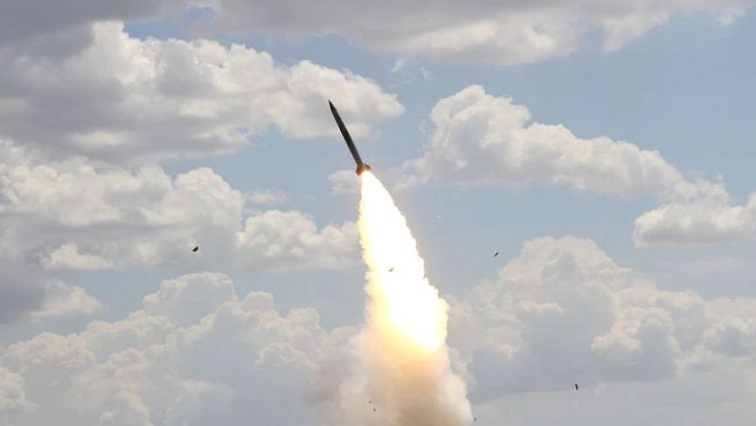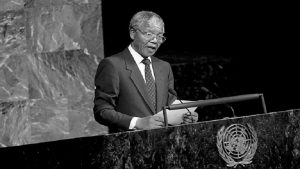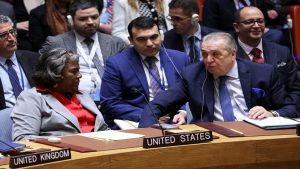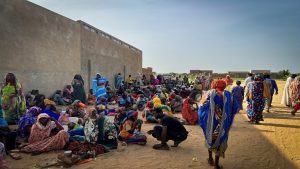Democratic People’s Republic of Korea (DPRK) has defended its country’s latest intercontinental ballistic missile launch as an exercise of its right to self-defence.
Envoy to the United Nations, Ambassador Kim Song made a rare appearance in the Security Council as the body met yet again to discuss North Korea’s test on Wednesday of its Hwasong-18 ICBM which the country’s leader Kim Jong-Un has described as the most powerful weapon in its nuclear arsenal.
The DPRK has launched 20 ballistic missiles in 2023 alone in violation of several Security Council resolutions, actions that have been condemned by the United Nations Secretary General.
North Korea defends its intercontinental ballistic missile launch
The last time the DPRK spoke in the Council was in 2017 – a country that has been under UN sanctions over its missile and nuclear programmes since 2006.
But, despite the punitive measures, it continues to thumb its nose at the international community’s efforts to denuclearize the Korean Peninsula.
Kim Song says, “Our test fire of a new type of ICBM Hwasong-18 is a warranted exercise of the right to self-defence, to deter dangerous military moves of the hostile forces and safeguard the security of our State and peace in the region without fail.
“The United States and South Korea military exercise that involving nuclear effort under the very dangerous and unrealistic aim of end of the region, of sovereign State constitute a risky act to spark disaster of nuclear war in the Korean Peninsula. At the present, the Security Council is taking a very dangerous path under the influence of the high handedness and arbitrariness with United States and its few followers.”
China and Russia have also pointed to the joint-military exercises by the United States and South Korea as provocative to Pyongyang while Washington believes Moscow and Beijing are preventing the Council from speaking with one voice.
Alternate US Ambassador Jeffrey Delaurentis says, “The Council cannot continue to be silent in the face of these provocations, and we must send a clear and collective signal to the DPRK-and all proliferators-that this behavior is unlawful, destabilizing, and will not be normalized. We call on all Member States to fully and faithfully implement all relevant Security Council resolutions. This includes preventing the DPRK from evading sanctions to advance its unlawful WMD and ballistic missile programs and associated global procurement network.”
China says it was committed to the denuclearization of the Korean Peninsula but took a swipe at what it views as western hypocrisy.
Chinese Ambassador Zhang Jun explains, “It is NATO itself that really needs to do some serious soul searching. Contrary to its claim to be a regional organisation, NATO breaks through the geographical scope, stipulated by its own treaty by projecting its power across the whole globe and advancing eastward into the Asia Pacific, thus bringing more negative and destructive impacts to regional and even global security.
Jun adds, “NATO calls itself a defensive alliance, however, it encourages its members to continuously increase military expenditure, carry out military activities around the world and constantly expanding their power across borders and provoke confrontation.”
But China and North Korea’s immediate neigbours offered a different view.
Japanese Ambassador Shino Mitsuko says, “This latest ICBM is estimated to have landed in waters near Japan, just 250 kilometers from Hokkaido. Once again, it endangered vessels, exposed aircraft in the surrounding area to great risk and terrified Japanese citizens. Japan condemns in the strongest possible terms.”
South Korea Ambassador Hwang Joon Kook says, “It is deplorable that the Security Council has remained silent in the face of DPRK’s repeated reckless behavior. It is a perfect example of its total disregard for international norms, as well as a brazen mockery of the functioning of the Security Council. The Republic of Korea reiterates that the door for dialogue remains wide open. We once again strongly urge the DPRK to immediately cease its destabilizing actions and respond to our repeated calls for serious dialogue.”
Efforts by the majority of Council members to punish the DPRK for its continued violations have been blocked by China and Russia who view any further actions as counterproductive.






